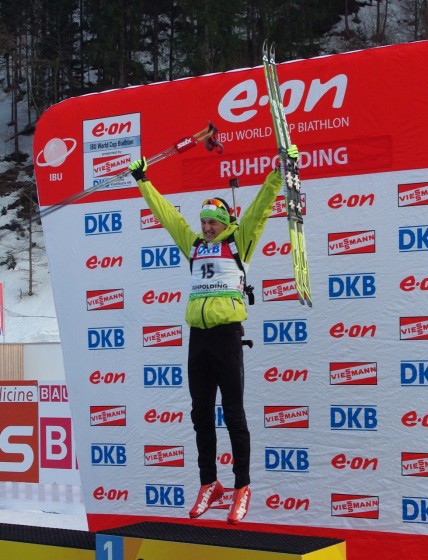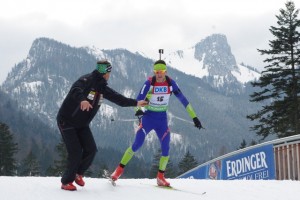
When Jakov Fak of Slovenia won his first World Cup biathlon race earlier this season, it wasn’t shocking; he had been fast since he was a junior, where he mixed it up at World Championships and European races with the likes of Martin Fourcade, Arnd Peiffer, and Anton Shipulin.
But until this season, Fak had an uncanny knack for doing his best on the sport’s biggest stages. It certainly was surprising in 2009 when, one year out of the junior ranks, he won bronze in the individual race at World Championships in Pyeong Chang, South Korea.
Back then, Fak was not Slovenian but Croatian. And after carrying the flag for his country in the opening ceremony of the Vancouver Olympics, he came through for his country with a bronze-medal performance in the sprint.
But all was not well in Croatia. (As we wrote yesterday, it has taken varying amounts of time for small countries to establish not only strong governments, but sports federations after the breakup of the Soviet Union, Czechoslovakia, and Yugoslavia.) While some sports had excellent infrastructure and support, and found success – siblings Janica and Ivica Kostelic for instance were (are) among the best alpine skiers of their era – biathlon was not so lucky or as organized.
Fak had been working with the Slovenian team, and in the fall of 2010 he switched nationalities. Both the cross country team, headed by Petra Majdic and her sprinting teammates, and the biathlon team were strong, and that’s where he’s made his home. The politics of his departure from Croatia, on the other hand, are something he’d rather not remember.

If that stress didn’t provide enough adversity, Fak traveled to the World Cup competitions in Fort Kent, Maine, the next season, where he got frostbite on his firing hand so badly that he was at risk of amputation – a career-ender for a biathlete.
By the next World Championships he was back to his usual self, winning gold in the 20 k individual a few days after taking part in the Slovenian mixed relay that appeared to also have won a championship, but had to settle for silver after an equipment malfunction mis-tallied penalties on the range. Coming so close to gold didn’t seem to temper the Slovenians’ enthusiasm one bit; they soaked up the experience and are surely looking forward to the format’s introduction at the Olympics next year.
But in all that time, Fak still had a single podium from a non-championship event. This season, things have changed. In the first semester the Slovenian had his breakout races on the World Cup, placing third in the sprint in Hochfilzen, Austria, and then turning it into a win in the pursuit. The next weekend on home turf in Pokljuka, Slovenia, he won the sprint and placed second in the mass start. He currently sits eighth in the World Cup standings.
Despite the intense travel and competition schedule experienced by World Cup biathletes, who race more days of the week than almost any other endurance athletes, Fak made time to answer some of our questions over e-mail.
FasterSkier: First of all, congratulations on your success so far this season! What do you think has allowed you to gain that extra gear? Did you have big changes in your training?
Jakov Fak: Thank you for your congrats!! I think we didn’t change much, but the main reason should be the hours under my belt and the experience that I got through the past seasons.
FS: Are you focusing on the Total Score in particular this year, and what are the differences for you between trying to peak at big races versus doing well all season?
JF: The main goal for me personally was to try to maintain a high competitive level through the whole season. I think that the main thing if you want to keep the good results going is your head. The level of form always goes up and down, but with a good preparation the ups and downs are not so big. Peaking at the chosen events is easier, but you can still make mistakes and fail to get the best for the event.
FS: You said after your first win this season that you had previously been a “big race” skier. What makes you able to do so well when it counts?
JF: The Slovenian media called me a ”big game” player, not me. I am a modest biathlete and do not like to call my self a big game player. I was making a joke after that, that I am not a big game player anymore; my big dream was to be good on the World Cup, and I am a big dreamer! I think the main thing is focus, but sometimes you can over burn in that process. I try to make it simple with lots of focus and no stress.
FS: The whole Slovenian team is doing well this year, like Teja Gregorin and Klemen Bauer. Do the women and men train together, and is your team close?
JF: Yes, Teja is doing well but I think that she would like to do even better. Our team is very good, and it is like a big family. We train together a lot, all the training camps are mainly done together so there are a lot of days spent together, which makes it easier to bond. The good thing is that you can bond easily, but the hard thing is when someone ends his career, like this year Vasja Rupnik ended his career, and a big hole was left behind him.
FS: It seems like in biathlon it is particularly hard to be consistent, not just in a season but from year to year. Why do you think that is?
JF: I think that the field in biathlon is very tight and that there is a constant pressure of a lot of athletes for the top places so it is hard to be consistent. Multiple seasons are even more hard, because every year the field gets stronger and tighter.
FS: I am very curious about your switch to Slovenia. Is it true that you had had a Slovenian coach for a long time and already been training with the team?
JF: Oh it’s not my favorite subject of conversation but, yes it is true I have been working with the whole team from summer of 2009.
FS: What is the sports system like in Croatia? In general, there are some strong sport teams there, but is there much of a biathlon or even cross country skiing community?
JF: The sport system is different in every sport. There are a lot of good systems, but you have to be lucky to work in a system like that. In biathlon that was reintroduced to the cross country skiers again in the year 2001. It was not developing as it should have, but that was due to ineffectiveness of the president of the Croatian biathlon association. As a matter a fact, his politics crashed and destroyed all the chances for biathlon to become a respectable sport in Croatia. I had a lot of struggles and fights to keep my career going on. This is a subject that could be discussed more but there is no need for it. Cross country skiing and biathlon are cooperating very well now because a lot of children are competing in both sports. But I am sure that that could be on a much higher level.
FS: Despite all that you seem to still be very patriotic to Croatia.
JF: Of course, who wouldn’t be! Nobody can take that from you. I will always be proud on my birth country. [The switch] is not a big deal, and it was all in sport purposes. That time it was a little confusing and I had some problems with Croatian biathlon association, but everything is okay now.
FS: Do you feel like you have the support of Slovenian fans at this point? Winning at World Championships must have helped.
JF: Yes, I think that I have, the media like to interview me and the fans are all positive. The medal always helps, and sometimes you feel like you have to give something back to your supporters, and what is a better gift than the medals.
FS: Do you still consider Croatia your home, and how much time do you get to spend there?
JF: Yes of course, but I can say that I have two homes. But still Croatia, and my hometown Mrkopalj are my true home. I like to spend time there, living near to my roots. I find peace there.
FS: Does the team’s training camp schedule allow you to go home?
JF: I spent a lot of time in Croatia, training camps are usually in Slovenia and the rest of the time I like to spend near to my family. The system in our team is that in training camps are usually held in our training center on Pokljuka, and all of the time in between the camps we train by ourselves where we want.
FS: Is there anything you are particularly looking forward to this season?
JF: I look forward to the races. There is nothing more interesting than the World Cup: every race is special, and every day is different and that is the beauty of outdoor sports.
FS: You will get to see the Sochi courses for the first time; what are you hoping for? What sort of trails and range would suit you the best?
JF: Yes, this is the first year that we are visiting the Sochi track, so I am curious about everything. I would like to get to know the courses and the shooting range, although it is a short time to get to know everything but we will do our best. Sometimes we like to joke that when you are in shape, everything suits you, and when not nothing suits you.
Chelsea Little
Chelsea Little is FasterSkier's Editor-At-Large. A former racer at Ford Sayre, Dartmouth College and the Craftsbury Green Racing Project, she is a PhD candidate in aquatic ecology in the @Altermatt_lab at Eawag, the Swiss Federal Institute of Aquatic Science and Technology in Zurich, Switzerland. You can follow her on twitter @ChelskiLittle.



